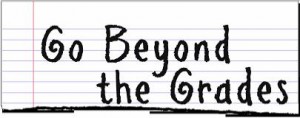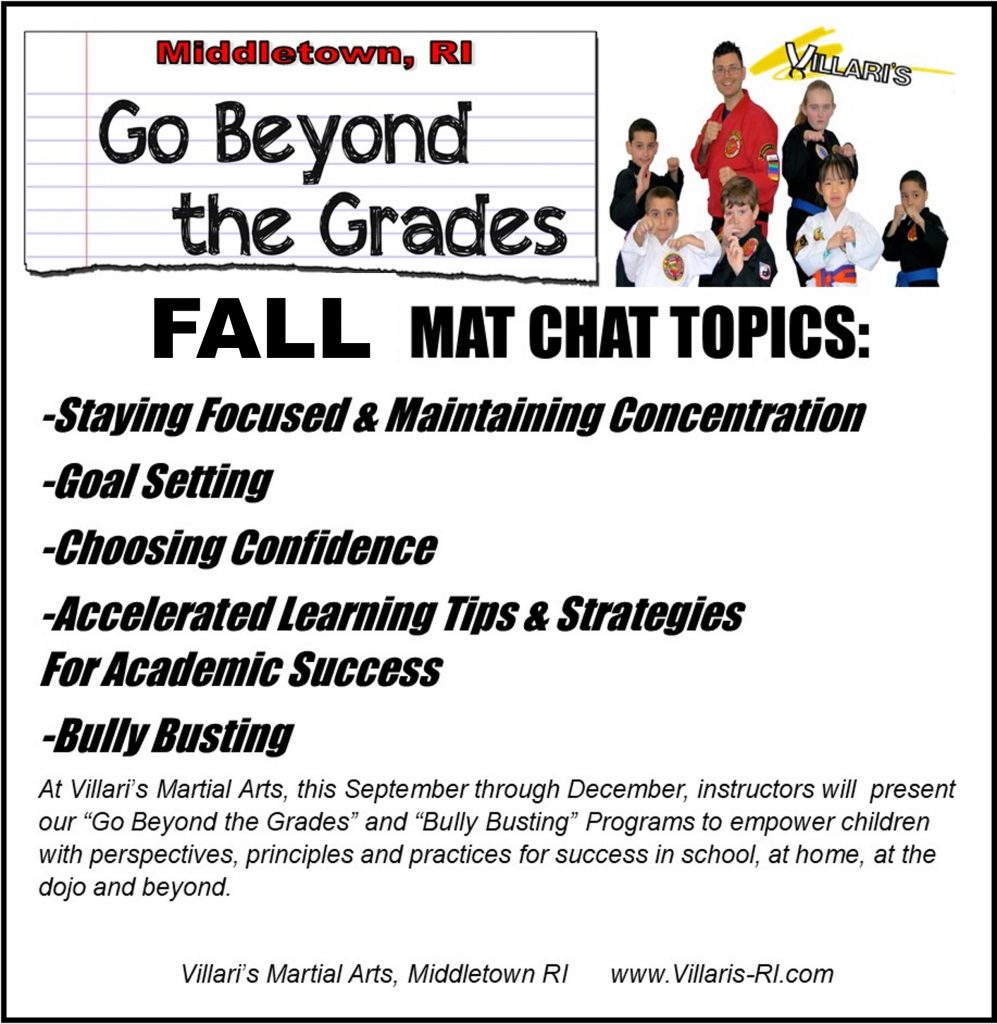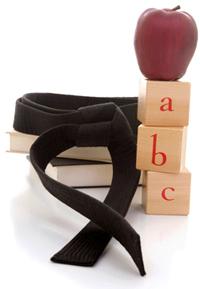School should be a springboard to becoming a successful adult.
At Villari’s Martial Arts, every September and October we present our “Go Beyond the Grades” Program for children and reinforce these topics through out the school year.
Program Features:
- Handouts detailing the topics covered
- In class Role Playing and Mat Chats covering topics
- Goal setting worksheet
- Parent Guides
Going Beyond the Grades
The report card is only part of the story. There’s the social awkwardness, the miscommunications, and of course, the bullies and their victims. Learn how to recognized and deal with the bullies. Develop the confidence to stand for something instead of falling for anything. Get the teacher on your side by letting them know you are there to learn. Improve focus in class, and learn to listen actively. Set some goals to keep you on track throughout the year. Get more than just good grades out of school.
Get the most out of your school experience
Good grades are important in school, but there are other things students can learn and develop as well. Students should be learning to improve focus, navigate successfully through social situations, develop a disciplined work ethic, and increase confidence and character. Many students want to develop these skills but are unsure how to go about doing so. When given some concrete exercises that teach them how to improve in these areas, children are given a sense of control and feel more accountable for their own success. By taking a few minutes to apply a few basic principles we can increase the likelihood of imparting these valuable lessons to students.
Staying Focused and Maintaining Concentration
Focusing on proper breathing while sitting at a desk will help students regain their focus and improve concentration, especially if they are feeling a little overwhelmed, confused, or even bored. Proper breathing will also have a calming effect when nervous about a test or speaking in front of the class. Just a few diaphragmatic breaths periodically throughout the day can make a big difference.
Proper breathing involves just a few simple keys: Breathe in through the nose and out through the mouth and/or nose naturally. There is no specific speed or rhythm that needs to be followed; however making the exhale slightly longer than the inhale is beneficial. Let the belly expand when inhaling and squeeze the belly in to exhale fully. Keep hands flat on the desk or legs and have their eyes open and relaxed so that focus remains on the teacher.
Connecting with the Teacher
A good connection with the teacher can help make the school year more constructive and enjoyable for everyone. Teachers get excited about students who are interested in learning. Students who sit slumped at their desk or staring off into space don’t seem very interested in learning. Sometimes the students are interested, but their body language does not convey that to the teacher. Students can practice showing their teacher that they are interested in what the teacher has to say with their body and face, as well as their level of participation in class.
You can practice these skills at home by role playing and providing feedback to the student on the following exercises: Practice focusing on the teacher whenever possible; try smiling, and nodding, making eye contact to demonstrate they are listening. Have the students work on keeping their shoulders back and head up while the teacher is talking; have them look up from their work when they can instead of always looking down at the desk. Play the role of the teacher and have the student ask questions, volunteer answers, and contribute to discussions in a strong, confident tone.
Choose Confidence
Everyone feels nervous and insecure at times. Confident seeming people may not always feel confident; they just learn to act confident. The shape of the body has power, and by practicing a strong shape and a strong voice, our feelings will respond and so will the people around us. Many bully and difficult social situations could be avoided by projecting a more confident demeanor. Remember, just the appearance of being confident will make you about forty percent more successful in whatever you are doing; whether it’s trying out for an activity, making a new friend, or dealing with a challenging situation. A little belief goes a long way!
Building Confidence
Practice the following physical and verbal exercises to build confidence: For the body; smile easily, and make eye contact with people. Offer your name or a greeting first. Have them pay attention to how they stand and move when they feel good; then remind them to duplicate that same posture when they feel less confident. Have them talk to you while keeping their arms relaxed and their stance open; they should face you squarely with their head up. For the voice; they should project their voice and speak clearly. Explain how to avoid prequalifying in the negative. Encourage them to do their best without making excuses, and speak about themselves and others in a positive way. Have a discussion about avoiding conversations that are negative, especially toward another person.
In the Martial Arts, there is a saying: “Repetition is the mother of skill.”
Practicing these few techniques consistently will help students squeeze the most out of school. School should be fun, not scary. Giving children tools which will help them succeed on their own will give them a sense of accomplishment that will help them develop into a responsible adult. Ultimately, that is every parent’s goal; to know that his or her child has been given an opportunity to live a successful life and transition from child to responsible adult
Get ready for an awesome school year!



